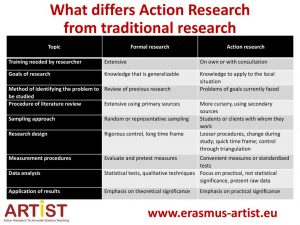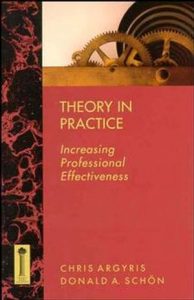This is the third instalment of the series on 21st century education by Ian MacDonald. In this paper, Ian suggests to persuade the method of action research not only as practice, but also as attitude towards education for the sake of facilitating an innovative learning environment that is always ready for the challenges of our changing world. This method does not only enable a dynamic approach towards education, if we treat it as attitude towards the ‘things-of-the-world’, it might help us avoid making the mistakes of generalisations, stereotyping, or applying structures and theory onto situations that are not entirely fitting. In other words, action research might help us avoid enforcing taken-for-granted ideologies and structures onto the world, and through this we can give space for the rising of the particular.

In the course of intellectual history, much formal academic knowledge has emerged through making explicit the informal knowledge of everyday life.
Argyris & Schön
Theory in Practice: Increasing Professional Effectiveness (1974: 8)
Conducting pedagogical action research[1], as opposed to traditional empirical research that we typically associate with academics, can leave us open to attacks from those who defend the use of lecture and PowerPoint. One common criticism concerns the corroboration of the impact of discontinuing PowerPoint-use. Action research is almost always vulnerable to this type of criticism because unlike traditional research, it does not set out to isolate research variables (i.e. participant samples are not rigorously selected to ensure consistency), since doing so would change the natural environment in which the research is conducted. Traditional academic researchers on the other hand typically assume tight control over their research samples, carefully selecting and matching research subjects to avoid variation.
In practice what do the above approaches look like for researching the impact of PowerPoint-use? Well the traditional researcher would probably wish to teach exactly the same topic to the same group of students on one occasion using PowerPoint and on a second occasion using a different pedagogical approach. They would probably also alternate the order in which the methods are used with different groups to measure whether that makes a substantial difference to the results. In this sense, it would be very much in the mould of what we typically perceive to be a scientific experiment. The aim would be to establish as precisely as possible whether one approach has greater impact and better learning results than the alternative being investigated. On the other hand, if you conduct action research you would almost certainly set-up the ‘experiment’ in a more natural and less-controlled environment, reckoning that the impact of class-participant composition will even out over a period of time – the more often you run the experiment and obtain similar results, the more comfortable you will be with the accuracy and reliability of your hypothesis. Therefore, when running a PowerPoint-free seminar and comparing the results to a previous seminar, or another seminar leader’s class, where PowerPoint was used, it’s obvious that the composition of the respective student groups is an uncontrolled factor in the outcome. How can you dismiss the possibility that any variation attributed to different students is a significant factor in the results? The short answer is you can’t.
 |
In the laboratory some variables can be controlled while others are varied. But in a practice environment, one does not know all the variables, there are more variables than can be handled, it is not possible to keep some variables constant whilst others are manipulated, it is often impossible to measure outcomes without affecting the outcome, and the time required for the experiment and action based on the results of the experiment is often greater than the time required for significant change in the situation under study.
Argyris &Schőn, 1974: 159 |
Even if we go on repeating a specific action research ‘experiment’ for many years – in my case the research ran over an 11-year period – we will still remain open to criticism regarding the control of variables. Whilst the action researcher is forced onto the back-foot and compelled to conjure up some form of defence, critics are left to claim apyrrhic victory. The value of action research as a method is far greater than any points scored concerning corroboration. Sometimes, for practical purposes, we have to accept that the sheer cost of corroborating research results is outweighed by what consistent outcomes and supporting rational and theory tells us.
Defenders of PowerPoint frequently respond to suggestions of ineffectiveness by stating that it’s not PowerPoint that’s the problem but the way we use it. This is an intriguing defence and those who employ it are blissfully unaware of the extent to which it represents a self-sealing argument. Let me surface the unspoken part of this retort: if you use PowerPoint competently then all the reported problems are avoided! Yet, this is patently not the case as has been adequately demonstrated in the first two instalments of this series – even when used in the ‘correct’ way, the method has numerous drawbacks.
My broader concern is not about this fallacious defence of PowerPoint but more so the dangerous attack on the important and valuable role of action research in pedagogical innovation. By all means, research should always be scrutinised and any weaknesses identified and rectified. Interestingly, if the tables are turned and defenders of PowerPoint are required to demonstrate the effectiveness of the method, they can rarely offer more than a handful of unconvincing research papers to support that view. The quality of such research is highly questionable as Movahedi (2021) confirms. Why the double standards?
I suspect that some academics simply find the democratic and collaborative nature of action research to be distinctly threatening. After all, it involves relinquishing a degree of control and empowering others. It means becoming more of a team player and permitting others to share the limelight. Keep in mind that many educators view their students like children whilst some strive to be the centre of attention.
| My friend, the respected researcher and author John Raven, writes about the need to facilitate widespread public participation in the process of defining problems, seeking solutions, translating the results into action, evaluating experiments and development and re-defining issues (1995: 227).
|
|
In short, he calls on us to nurture a pervasive climate of innovation. For this to happen we all need to develop the competencies required to participate in running modern society effectively. Where better to develop these competencies but in schools, business schools and universities?
Finnish business schools have blazed a trail in pursuing the above goal, with the Team Academy concept – an approach that is aimed at developing entrepreneurs in coach-supported teams –emerging in Jyväskylä in 1993. The idea spread to other universities of applied science such as Tamperre (Proakatemia) and Turku (Business Academy), morphing and evolving along the way. I have visited Turku on numerous occasions and there they have taken a step beyond Team Academy by developing what is called Innovation Pedagogy[2]. Whilst such pedagogical approaches may not provide a template for every business school, they do provide examples to study, to experiment with and to adapt to different local circumstances.
Next time I will discuss the impact twelve years of Doctoral study has had on my development as an educator. One obvious element of that study is a vast amount of reading and I propose to share with you an essential reading list for business school educators. In fact, those who wish to do so may respond to this survey which aims to determine awareness of important texts on education. As a body of research and writing, the texts represent something of a canon of business education literature.
In closing, it seems appropriate to quote words of wisdom from Neil Postman, a protégé of Marshal McLuhan:
The developments in educational technology are intended to do all of the old school stuff better – and they probably do, but that’s not the aim of the new education. We’d use all – or whatever is relevant at any particular juncture – of the emerging educational technology, but only to help learners learn strategies for survival in a changing world. This is the world to which the new education addresses itself. That’s what’s new about it, and that’s why new kinds of teachers are needed to make it go.
Neil Postman, Teaching as Subversive Activity (1969: 149)
Bibliography
Argyris, C. & Schön, D. A. (1974)Theory in Practice: Increasing Professional Effectiveness San Francisco: Jossey-Bass
Movahedi, F. (2021)The Use of PowerPoint as a Pedagogical Tool: Is it effective?Unpublished Research. Available at
Norton, L.(2009) Action Research in Teaching and Learning London: Routledge
Pentilla, T., Kairisto-Mertanen, L., Putkonen, A.& Lehto, A. (2013) Innovation Pedagogy – A strategic learning approach for the future in Lehto & Pentilla (eds.) Pedagogical Views on Innovation Competences and Entrepreneurship: Innovation pedagogy and other approachesTurku: Consortium for Applied Research and Professional Education
Postman, N. (1995) The End of Education: Redefining the Value of School New York: Alfred A. Knopf
Raven, J. (1995) The New Wealth of Nations: New enquiry into the nature and origins of the wealth of nations and the societal learning arrangements needed for a sustainable society New York: Royal Fireworks Press
Notes
[1]“Pedagogical action research involves using a reflective lens through which to look at some pedagogical issue or problem and methodically working out a series of steps to take action to deal with that issue. As in all forms of research (pure and applied) the ultimate aim is to publish, but of equal importance is the imperative to change one’s practice.” (Norton, 2009: xvi)
[2]“Innovation pedagogy refers to an approach to learning and teaching that corresponds to the needs of working life whilst emphasising R&D expertise. In the approach learning and teaching methods are applied creatively and in a value-adding way so that the students take responsibility for their learning and actively strive to achieve their learning goals” (Pentilla et al, 2013).
